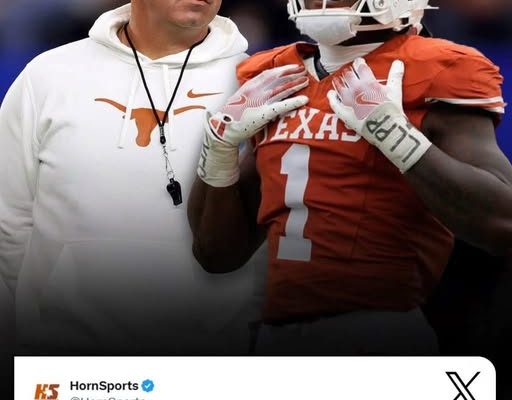The Texas Longhorns have always thrived on the balance between raw athleticism and disciplined execution, a balance that has defined some of their greatest teams in history. Every so often, a player comes along who captures the imagination of fans, coaches, and analysts alike with jaw-dropping speed, instinct, and sheer explosiveness. Colin Simmons, the highly touted edge rusher who chose Texas over a host of powerhouse programs, has already shown flashes of why he was such a coveted recruit. His speed off the edge, his relentless pursuit of the quarterback, and his ability to disrupt plays in the backfield make him an immediate fan favorite and a nightmare for opposing offensive coordinators. But there’s one growing narrative surrounding Simmons that is less about his physical gifts and more about how he channels them: the idea that Texas needs him to slow down. That statement may sound counterintuitive at first—why would a team want their defensive weapon to slow down when he is already overwhelming offensive linemen with his burst? The truth is, sometimes being too fast, too eager, or too aggressive can actually hurt a defense more than help it. And that’s where Simmons’ growth will define his impact at Texas.
What makes Simmons so unique is that he plays the game at one speed: all-out. From the moment the ball is snapped, he’s firing off the line like a rocket, trying to bend the edge and collapse the pocket before the quarterback even finishes his drop. On one hand, this is exactly the type of havoc defensive coordinators dream about. On the other, it creates a vulnerability—quarterbacks and play-callers at the college level are smart enough to use his speed against him. Already in early flashes, Simmons has shown moments where his eagerness has led to over-pursuit, creating lanes for quarterbacks to step up or running backs to slip through draws and misdirection plays. These are not signs of weakness, but rather the normal growing pains of a young defender with almost too much talent for his own good. That’s why the call for him to “slow down” is not a call to reduce his intensity, but to refine his patience, discipline, and situational awareness.
When you study the great pass rushers who have gone on to dominate both at the college and professional levels, what separates them from everyone else is not just speed or power—it’s timing. The ability to know when to go full throttle and when to hesitate for half a beat to diagnose the play is what makes players elite. Simmons is already physically gifted enough to terrorize offensive lines, but he has to learn the art of pacing himself within the chaos. A player like Will Anderson Jr., who Alabama turned into one of the most polished defenders in recent memory, built his reputation not just on speed but on the way he controlled his energy and never got caught out of position. If Simmons can adopt that same mentality, Texas will have not just a dangerous pass rusher but a complete defensive anchor.
Slowing down also matters in terms of conserving energy. In the early stages of his college career, Simmons is still adjusting to the grind of high-level football where every snap matters, every offensive lineman is stronger than he’s used to facing, and every scheme is designed to exploit tendencies. If he tries to go at 100 miles per hour every single play, he risks burning himself out by the second half of games. For Texas to get the best version of Simmons across four quarters, he has to learn how to manage his effort, pick his spots, and understand when a play is designed to bait him. By conserving energy in certain moments, he will be fresher and more effective when it matters most, especially in clutch situations when Texas needs a game-changing sack or a momentum-shifting stop.
But perhaps the most important reason Simmons has to slow down is because Texas as a program is on the cusp of something massive. The move to the SEC, the pressure to compete at the highest level of college football, and the national spotlight on the Longhorns mean that every mistake is magnified. Opponents will game-plan specifically to neutralize Simmons because of his reputation. That means more screen passes to his side, more RPOs designed to freeze him, and more misdirection to get him biting on the wrong key. If Simmons continues to play with pure speed and no hesitation, those plays will work. If, however, he slows himself mentally, trusts his eyes, and forces quarterbacks to hold the ball for just a second longer, his speed will be unleashed in a much more devastating way. Discipline will amplify his natural gifts rather than limit them.
It’s also worth noting that Simmons is still incredibly young. Fans often forget that these top recruits are teenagers thrust into enormous pressure situations where every snap is dissected by fans, media, and scouts. The patience Texas fans must have with Simmons mirrors the patience Simmons must have with himself. Developing into a complete defensive player takes time, and while it’s tempting to want him to dominate right away, the Longhorns’ long-term success will come from him evolving steadily into a more measured force. Sometimes slowing down in your approach allows you to speed up your development, and that’s a lesson he will learn as he gains more reps.
There’s also the leadership factor. If Simmons can show that he’s not just playing with reckless abandon but with poise, he sets the tone for the rest of the defense. Younger players and veterans alike feed off energy, but they also feed off composure. Texas hasn’t always been known for defensive discipline in recent years, and Simmons has a chance to change that culture. By slowing down his game in the right moments, he can lead by example, showing that chaos can be controlled, and aggression can be strategic rather than random. That shift in mentality could be the difference between Texas having a good defense and having a championship-caliber one.
Another part of this discussion is about trust between Simmons and his coaches. Coaches want to know that their defensive schemes won’t be broken by an overzealous edge rusher flying out of position. If Simmons shows the maturity to stay within the system and play with patience, it will open the door for the staff to design even more creative blitzes and stunts around him. Imagine the impact of Simmons’ speed when paired with disguised pressures, delayed blitzes, or coverage rotations that force quarterbacks into holding the ball just long enough. Slowing down does not mean being less impactful—it means becoming unpredictable, and unpredictability is the greatest weapon a defender can have.
The excitement around Colin Simmons is absolutely justified. He is the type of player who changes the trajectory of a program. Texas fans have every reason to be thrilled about his future. But the message that he needs to slow down is not criticism—it’s advice born from experience. The Longhorns don’t want to dim his light; they want to focus it so that it shines brightest when it matters most. Texas is no longer just playing for Big 12 dominance; the program is entering the SEC, where the margin for error is razor-thin. One misstep by a defender can be the difference between a victory and a crushing defeat. Simmons’ ability to adapt, mature, and learn when to unleash his speed and when to hold back will define not just his career but Texas’ success in the years ahead.
As a fan, it’s easy to get swept up in the highlight plays—the lightning-quick sacks, the explosive hits, the moments that go viral on social media. But the true measure of greatness in football often comes in the subtle plays that don’t make the highlight reel: the edge rusher who stays disciplined on a read-option, the defender who contains instead of over-pursues, the player who forces a quarterback to throw the ball away rather than scrambling for a first down. These are the plays Simmons has to embrace if he wants to move from talented to legendary. And those plays come from slowing down, trusting your instincts, and letting the game come to you rather than forcing it on every snap.
The Texas Longhorns have their eyes set on being not just competitive but dominant in the new era of college football. Colin Simmons can be a central figure in that journey, but only if he balances his remarkable speed with patience and discipline. The coaches know it, his teammates know it, and deep down, Simmons himself will learn it through experience. For now, though, the Longhorns desperately need him to slow down—not forever, not in terms of his motor or effort, but in the mental side of the game where greatness is forged. That is the path to him becoming a name etched into Longhorn history, not just as a flashy recruit but as a cornerstone of a championship defense.
So now the question goes to you, the fans and readers—do you agree that Colin Simmons needs to slow down and refine his approach, or do you think his raw speed should be unleashed without hesitation? Is discipline more important than chaos in today’s game, or do you believe that a player like Simmons should just be turned loose and allowed to overwhelm opponents however he can? Drop your thoughts in the comments and let’s hear what you think about the Longhorns’ future with this incredible young talent.



